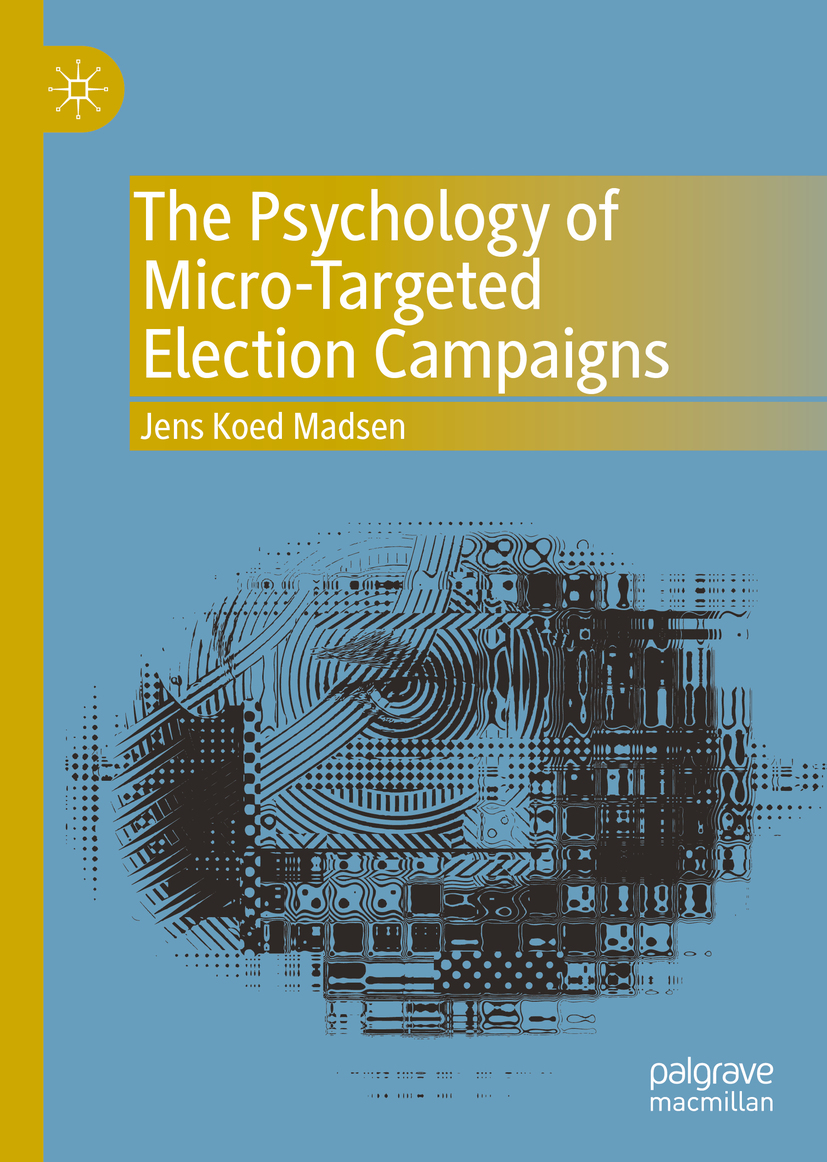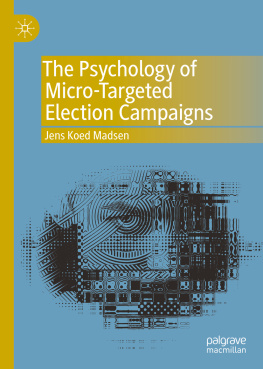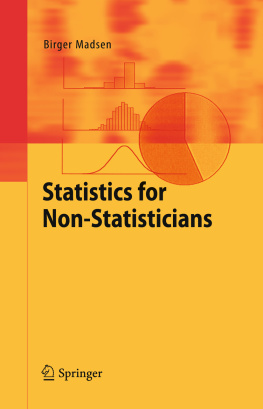Jens Koed Madsen - The Psychology of Micro-Targeted Election Campaigns
Here you can read online Jens Koed Madsen - The Psychology of Micro-Targeted Election Campaigns full text of the book (entire story) in english for free. Download pdf and epub, get meaning, cover and reviews about this ebook. year: 2019, publisher: Springer International Publishing, genre: Politics. Description of the work, (preface) as well as reviews are available. Best literature library LitArk.com created for fans of good reading and offers a wide selection of genres:
Romance novel
Science fiction
Adventure
Detective
Science
History
Home and family
Prose
Art
Politics
Computer
Non-fiction
Religion
Business
Children
Humor
Choose a favorite category and find really read worthwhile books. Enjoy immersion in the world of imagination, feel the emotions of the characters or learn something new for yourself, make an fascinating discovery.
- Book:The Psychology of Micro-Targeted Election Campaigns
- Author:
- Publisher:Springer International Publishing
- Genre:
- Year:2019
- Rating:5 / 5
- Favourites:Add to favourites
- Your mark:
- 100
- 1
- 2
- 3
- 4
- 5
The Psychology of Micro-Targeted Election Campaigns: summary, description and annotation
We offer to read an annotation, description, summary or preface (depends on what the author of the book "The Psychology of Micro-Targeted Election Campaigns" wrote himself). If you haven't found the necessary information about the book — write in the comments, we will try to find it.
The Psychology of Micro-Targeted Election Campaigns — read online for free the complete book (whole text) full work
Below is the text of the book, divided by pages. System saving the place of the last page read, allows you to conveniently read the book "The Psychology of Micro-Targeted Election Campaigns" online for free, without having to search again every time where you left off. Put a bookmark, and you can go to the page where you finished reading at any time.
Font size:
Interval:
Bookmark:


Cover illustration: George Peters/Getty Images
This Palgrave Macmillan imprint is published by the registered company Springer Nature Switzerland AG.
The registered company address is: Gewerbestrasse 11, 6330 Cham, Switzerland
Writing a book is a long drawn-out affair. Without a network of close friends, I would surely have thrown in the towel on this project long ago. I want to thank Ashleigh Arton, Oliver Bothwell, Rebecca Chamberlain, Hani Channir, Signe Clemensen, Ella Kahn, Anders Lautrup, Anna-Line Massot, Jakob Mlgaard, Lawrence Newport, Louise Olsen, Thomas Ovens, Vanessa Peterson, Hannah Schiele, Kurt Schleier, Karl Smith, and many others for all the wonderful days and evenings in your companyit keeps up my spirits and refreshes and challenges my ideas.
In addition to friends, this book would have been significantly worse had it not been for wonderful colleagues at Oxford, UCL, Birkbeck, and elsewhere. I am thankful for the continued collaboration and discussion with Ernesto Carrella, Stephen Cowley, Jesse van der Grient, Adam Harris, David Lagnado, Stephan Lewandowsky, Saoirse OConnor, Davide Secchi, Gillian Willis, Lee de Wit, and untold others with whom I have discussed the ideas in this book. Of particular note, I want to thank my academic mentors who have guided me at UCL, Birkbeck, and Oxford. They have been crucial to my development as an academic and as a person. These are Richard Bailey, Nick Chater, Ulrike Hahn, and Mike Oaksford. Im also grateful to my editor, Joanna ONeill, for keeping my feet to the fire.
Much of the book was written during commutes between London and Oxford. I am genuinely grateful for TFLs excellent servicein particular, the hard-working and incredible bus drivers of route 36. Also, I want to express my gratitude to Sally Butcher at Persepolis and the people of Peckham more generally.
A raft of shows have kept me entertained and politically motivated during the writing processI am grateful for cultural motivation from The Late Show with Stephen Colbert , The Daily Show with Trevor Noah , Late Night with Seth Meyers , Full Frontal with Samantha Bee , Last Week Tonight with John Oliver , Patriot Act with Hasan Minhaj , and The Mash Report with Nish Kumar . Further, podcasts make my commute and motivation easier: Revolution (thanks, Mike Duncan), Totally Football with James Richardson , In Our Time , Womans Hour , This American Life , Crimetown , The Guardians Politics Weekly , Black on the Air with Larry Wilmore , 2 Dope Queens , The Wilderness , and Talking Politics .
Most especially, I want to thank my family: Tage and Anders Koed Madsen, Anette Judithe Madsen, Karen Riisgaard, and my nephews Lauge and Asger Koed Riisgaard for being absolute little champs, Ajay Patel for being my English Brother, Toby Pilditch for continued and wonderful friendship and collaborations.
The Psychology of Micro-Targeted Campaigns explores how campaigners can use data-driven, psychologically informed models to improve the success of their persuasive attempts. In essence, a model is a representation of how a system functions and is structured. Models can be descriptive and verbal or predictive and mathematical. In politics, campaigners can develop models of the voters to understand how they think and why they behave the way they do. Effectively, campaigners are trying to develop accurate and representative models of voters to predict how to change their beliefs and influence their behaviour as effectively as possible. For example, campaign managers may assume people seek out confirmatory evidence before seeking out disconfirmation or material that challenges their worldview. Such a psychological insight can be useful when designing persuasive efforts, as they can develop strategies that play on this human trait.
A model is only as good as its assumptions and the data that informs it. If the model is accurate, it should predict outcomes more often than not; the better the model, the more of the variance it can predict. A model that predicts 81% of candidate choice is better than one that predicts 67%, even if both are above chance. Modellers have to balance simplicity with specificity. Simple models are manageable, but may be too coarse. Comparatively, highly sophisticated models may be more precise, but may be too unwieldy. The job of the campaign modeller is to find the model of the electorate that provides the best prediction , but is nonetheless manageable.
Data and psychological insights may inform campaign management. However, while some persuasive efforts work well with some members of the public, they may be counterproductive with others. The reception of the persuasive attempt is coloured by the subjective pre-existing beliefs of the listener, by their perception of the credibility of the speaker, by their individual psychological traits, and other aspects. Fundamentally, the electorate is heterogeneous in their beliefs, desires, and preferences. Due to this, campaigners may go beyond a one-size-fits-all approach and design persuasive attempts that are intended for a specific subset of the population rather than the population as a whole. This is micro-targeting : the design of messages that are specifically developed to resonate with a desired target audience. By collecting relevant data about each voter, campaigners can build models that segment the electorate into increasingly specific and sophisticated categories.
Of course, political micro-targeting can be harmful when it is used to manipulate the electorate, when providing unfair political advantages, or when used to deliberatively disseminate misinformation. However, while it can be used malevolently, the techniques can also be used positively for social good. An in-depth understanding of causes for discrimination generates better interventions to combat this; psychologically valid models of behaviour informed by personalised data may make public health campaigns more effective. As with all methods, micro-targeting can be used malevolently and positively. However, unless we understand the methods, we cannot generate appropriate rules and regulations for campaigns and fair data use.
Font size:
Interval:
Bookmark:
Similar books «The Psychology of Micro-Targeted Election Campaigns»
Look at similar books to The Psychology of Micro-Targeted Election Campaigns. We have selected literature similar in name and meaning in the hope of providing readers with more options to find new, interesting, not yet read works.
Discussion, reviews of the book The Psychology of Micro-Targeted Election Campaigns and just readers' own opinions. Leave your comments, write what you think about the work, its meaning or the main characters. Specify what exactly you liked and what you didn't like, and why you think so.











![Jens Gustedt [Jens Gustedt] - Modern C](/uploads/posts/book/146099/thumbs/jens-gustedt-jens-gustedt-modern-c.jpg)